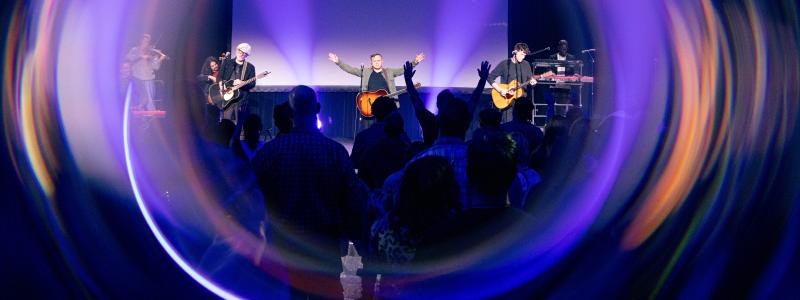On a wet October morning in Langley, students with coffee-stained sleeves and guitar cases queued outside the David E. Enarson Gym. The brisk air was filled with chatter with a repeated theme: worship, songs, theology. The WOR/TH Conference had come to Trinity Western University on Oct. 25, and the day promised the rare combination the organizers kept repeating: a classroom and a chapel—lesson and liturgy braided together until they were hard to tell apart. Doors opened, a tide of bodies spilled in, and the hum of sound checks surrendered to the first low thrum of singing. It was 9:30 a.m., and it would be 9:30 p.m. before the lights finally cooled.
What WOR/TH Is
WOR/TH calls itself a one-day worship and theology seminar, but that undersells the ambition. The language of the movement is plain: come back to the heart and the mind of worship, write and lead what is deeply biblical, relevant, and poetic, and paint a big picture of God with the songs we hand our communities to sing. It is equal parts call to craft and call to conscience, a nudge to scrutinize what we sing as carefully as how we sing it.
Before the first note rose, singer Matt Redman stepped to the microphone and prayed what became the keynote of the day. “Faith thing, this worship thing, this only-Jesus thing,” he said softly. “So much of this is about seeing. It’s about the Lord. So Holy Spirit, we pray today that you would open up our eyes. We would see Jesus, and then we would go with Jesus, and through Jesus, and in Jesus, to the Father. And in this place today, we get caught up in something so glorious. We get caught up in something so other; the people of God in the presence of God pouring out their praises to the Triune God.”
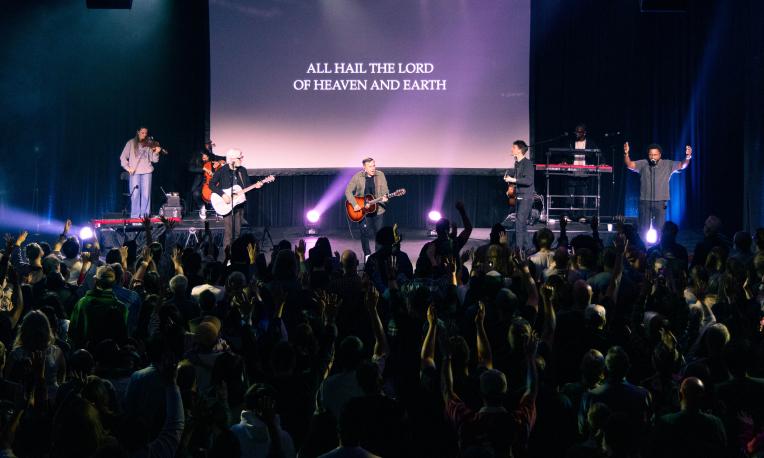
The Faces Behind the Music
By mid-morning, you could sense why the gym suddenly filled. The names on the docket carried long histories into the room. Matt Redman, UK born and Orange County based, anchored the day as host, the writer of congregational staples like “10,000 Reasons (Bless the Lord),” “Blessed Be Your Name,” “The Heart of Worship,” and “Son of Suffering.” The conference exists because Redman wanted a place where songwriters and worship leaders could think deeply about sung theology, about the words that ricochet through a sanctuary long after the band packs up.
Across the stage and schedule, Canadian songwriter Matt Maher offered a counterpart and a home-field echo, familiar to many in the crowd for “Lord I Need You,” “Run to the Father,” “Your Grace Is Enough,” and “Because He Lives (Amen).” There were other voices in the mix who stretched the day’s frame wider: Josh Aaron, whose recent co-writes include “Saints of Old”; David Funk, the Georgia-raised, California-based worship leader and co-writer behind “Son of Suffering” and “Lamb of God”; and Dr. Glenn Pakiam, the pastor-scholar whose bibliography Blessed, Broken, Given, The Resilient Pastor, and Worship and the World to Come speaks to a vocation that holds church, culture, and doxology in conversation. The lineup, and the balance it represented, was the point: poets and pastors, practitioners and theologians, all arguing that craft and conviction belong in the same breath.
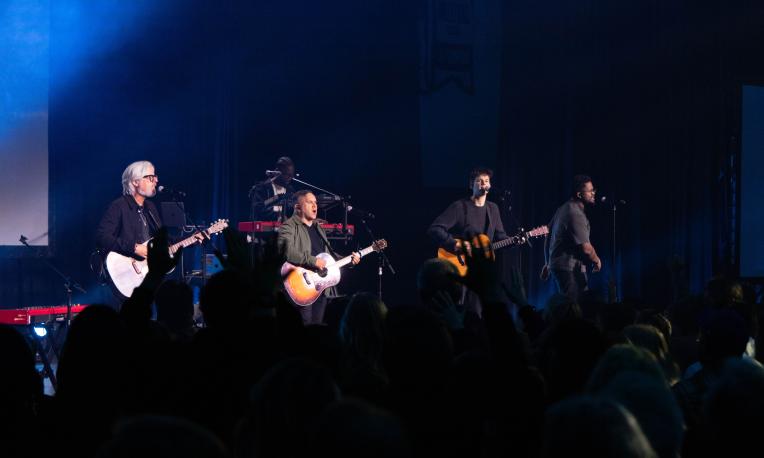
The Songwriting Panel: Hard Work as Spiritual Practice
By midday, the room shifted from lecture to workshop, from theories about worship to the work of words. They spoke about craft like it was a kind of pastoral care and the lyric line as something you hand to someone for the walk home.
One story from Redman stayed with the crowd. It was about a man in a Louisiana prison who said, “I figured out a long time ago I would much rather be in here for the rest of my life and know Jesus than be outside and not know him.” The gym fell still, the way a congregation stills when truth finds its centre.
From there, Redman pressed into patience. “In the church, we might need a few less hamster songs and a few more elephant songs,” he said, smiling. “Hamsters take sixteen days. Elephants take hundreds. When that elephant arrives, it is strong and it will be around for a long time.” The laughter carried agreement. Take the time. Let the song stand.
Session One: Matt Redman on Measuring Worship
Matt Redman’s teaching session began like a mirror turned gently toward the church. He offered not a formula but a discipline. “If we want to keep worship healthy, we have got to measure,” he said. “Because if we do not measure, we will not know if it is healthy.” His point was simple and profound: measure songs the way one checks a pulse, not to condemn but to care.
He spoke about the Lord’s Prayer as a kind of diagnostic tool. Does our worship sound communal like “Our Father”? Does it acknowledge God’s holiness as sacred? Does it hunger for his glory as much as for daily bread? And when we sing, is it obvious that this is not a solo act but the sound of a family?
The question beneath them all was this: are we putting God on display as he revealed himself, or as we prefer him to be? Then came a sentence that drew an almost physical response from the crowd. “We are not performers. We are priests,” said Redman.
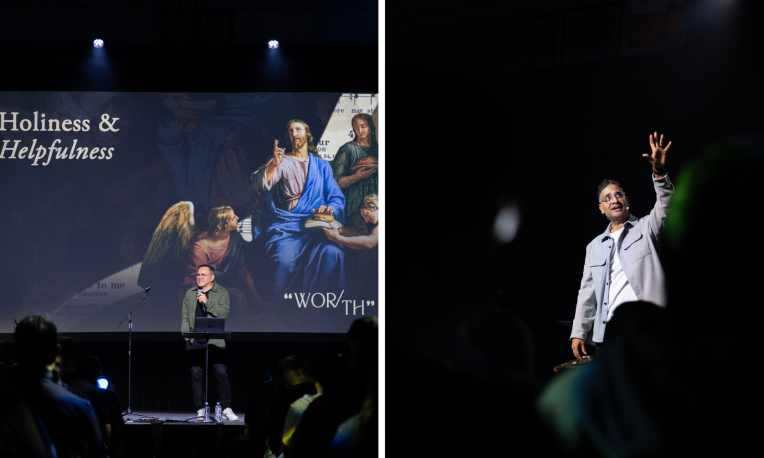
Session Two: Dr. Glenn Pakiam on Singing Hope
If Redman built the framework, Dr. Glenn Pakiam filled it with light. He spoke softly at first, tracing Acts 16 and the moment when Paul and Silas, beaten and chained, began to sing. The room listened as he paused on one verse. “To sing with hope is to sing at midnight as if morning has come,” said Pakiam.
Christian hope, he explained, is not escape, not progress, and not mere optimism. Hope is rooted in the creed the church has carried for seventeen centuries. “There will be a return,” he said. “There will be a reckoning, a reign, a resurrection, and a renewed creation.” Every line felt like a promise being rediscovered.
He told stories of how communities are formed by what they sing together, how God designed the human body to release oxytocin when voices blend—a biological affirmation that unity and joy are divine design, not coincidence. He invited the audience to take off their headphones, to remember that worship is not an individual playlist but a communal act that reshapes how we live.
And then he added a closing thought that gathered every session’s purpose into one invitation: “When you sing like morning has come, you start to live like morning has come.”
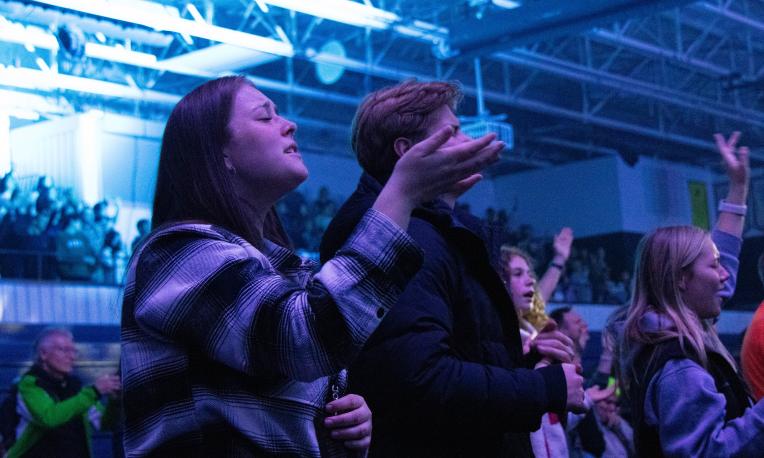
Evening: The Song Becomes the Sermon
By nightfall, the gym felt changed. The “Night of Worship” was more than a concert. It was the sermon the day had been preaching. The songs were no longer case studies; they were lived theology. The crowd sang until the sound felt physical.
On the edge of the bleachers, a pastor mouthed familiar lyrics as if he were hearing them for the first time. Around them, people held hands or raised arms. What they had learned that morning—truth, balance, and patience—was now being practiced in real time.
When the last chord faded and the house lights rose, no one seemed eager to leave. Friends clustered in circles, swapping reflections, humming refrains, promising to write together.
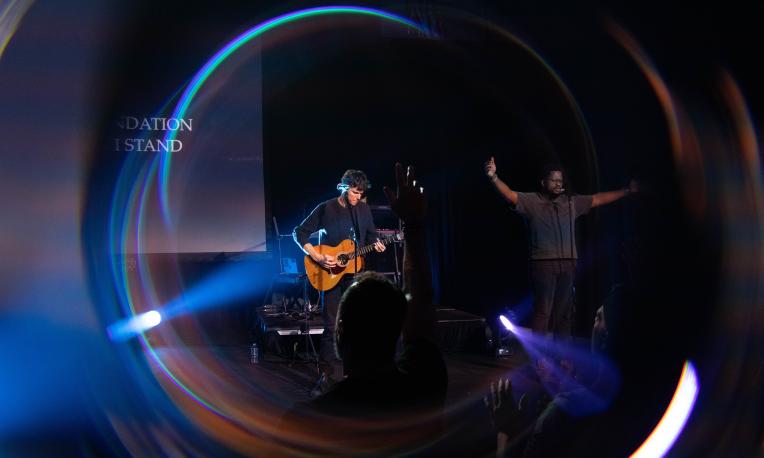
The Echo That Remains
What remains after a day like this is not only notes in a notebook but posture. Perhaps it is permission to make space in set lists for Scripture to breathe and to teach hope that is larger than the self. Perhaps it is courage to keep writing songs that take time, to measure faithfully, and to balance beauty and truth.
Or perhaps it is gratitude. Gratitude that in a university gym on a rainy Saturday, God drew saints and students together to rediscover the oldest lesson: his truth, sung with beauty, always finds its way back to the human heart.
About Trinity Western University
Founded in 1962, Trinity Western University is a global Christian liberal arts university dedicated to equipping students for life. Uniting faith and reason through Christian teaching and scholarship, TWU is a research institution offering undergraduate and graduate degrees in the humanities and sciences as well as in several professional schools. It has campuses in Canada in Langley, Richmond, and Ottawa. Learn more at www.twu.ca or follow us on Instagram @trinitywestern, Twitter @TrinityWestern, on Facebook and LinkedIn. For media inquiries, please contact: media@twu.ca.

